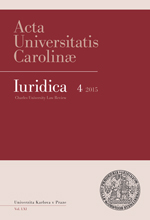Jazykový zákon (1920): česká odplata, upevňování národního charakteru státu, hospodářsko-sociální pragmatismus, nebo kultivace tradice bilingvismu? K názorům české veřejnosti na významy státního jazyka
The Language Act (1920): Czech Revenge, Reinforcement of the National Character of the State, Economic and Social Pragmatism, or the Refinement of the Tradition of Bilingualism? Comments on Opinions of the Czech Public on the Importance of the State
Author(s): Blanka SoukupováSubject(s): Law, Constitution, Jurisprudence
Published by: Univerzita Karlova v Praze, Nakladatelství Karolinum
Keywords: the Language Act; the constitution; the Czechoslovak Republic; Czech society; Czech-German society; historical reminiscences; national character of the state; symbolic role of a language
Summary/Abstract: The introductory subchapter deals with the unequal status of the Czech language in the Austrian state and in the Austrian-Hungarian Monarchy, as well as with its identityconstituting (symbolic, integrative) importance. The unsuccessful fight for making the Czech language equal with the dominant (in fact state) language – i.e. German – had been strongly politicised since the 1870s. The German language thus became a symbol and means of the forcible preservation of German privileges in the Austrian Monarchy. The dominance of the German language was perceived most sensitively by active minority officials in borderlands where the Germans were a majority. The only party fighting against time nationalisation of the monarchy was the Social Democratic Party, which strove for the victory of the socialistic ideology, after which the language issue would be, according to naïve party propaganda, automatically and fairly resolved. However, the Czech society entered the first Czechoslovak Republic not only with these reminiscences but also with the experience of World War I, during which the Czech language diminished in importance even more. The second subchapter analyses the official Czech thinking after a so-called coup. The Czechs considered the new state to be their creation and the continuation of the medieval state. Despite certain negative stereotypes of the indigenous Germans, they were guaranteed all civil rights by the Czech political representation. The third subchapter concerns two points of view of the Language Act as a part of a constitutional law (29 February 1920), which established the Czech and Slovak languages as the official state languages of the republic. The subchapter brings evidence of the period reminiscences of “the suppression” of the Czech language in the Hapsburg state on the one hand, and on the other hand, it emphasises the importance given to the terms ‘official’ and ‘state’. Both terms were finally used in the constitutional law. The fourth subchapter is dedicated to the Czech assessment of the new constitution, which was perceived as a great work of the young democracy and as the basis of the Czech state independence, a proof of the “de-Austriasation” of the Czech lands. The fifth subchapter points out how the new constitution was abused for a political fight in which all large political parties, except for the Social Democratic Party (in the spirit of its tradition), got involved. While the sixth subchapter deals with the negative attitude of Czech-German policy to the Language Act regarded as a betrayal of democratic principles, as a means of oppression of non-Czech nationalities in the republic, and as an act of their forcible “Czechisation”, the seventh subchapter analyses extreme Czech conceptions. It was Czech minority workers in the borderlands who kept recalling the unfair language practices by the Austrian state, the undignified status of the Czech language at the beginning of the Czech national movement, and the role of the Czechs as alleged founders of the new republic, as well as the lasting aggressive relationship of the Germans in the borderlands to the Czech language. Positive Czech (minority) opinions emphasised the tradition of bilingualism and the opportunity the Czech-German minority speaking Czech had to get to know the Czech culture and society better. The final subchapter then documents the discrepancy between the Czech-German policy of refusing the Czech language and the Czech-German practice of reasonable acceptance of learning Czech as an economic and social must. The Language Act undoubtedly stirred public opinions – from the Czech majority view it became a product of liberal Czechoslovak democracy, while from the German view it was an act endangering the German consciousness of Bohemian Germans in the Czechoslovak Republic.
Journal: Acta Universitatis Carolinae Iuridica
- Issue Year: 61/2015
- Issue No: 4
- Page Range: 23-35
- Page Count: 13
- Language: Czech

